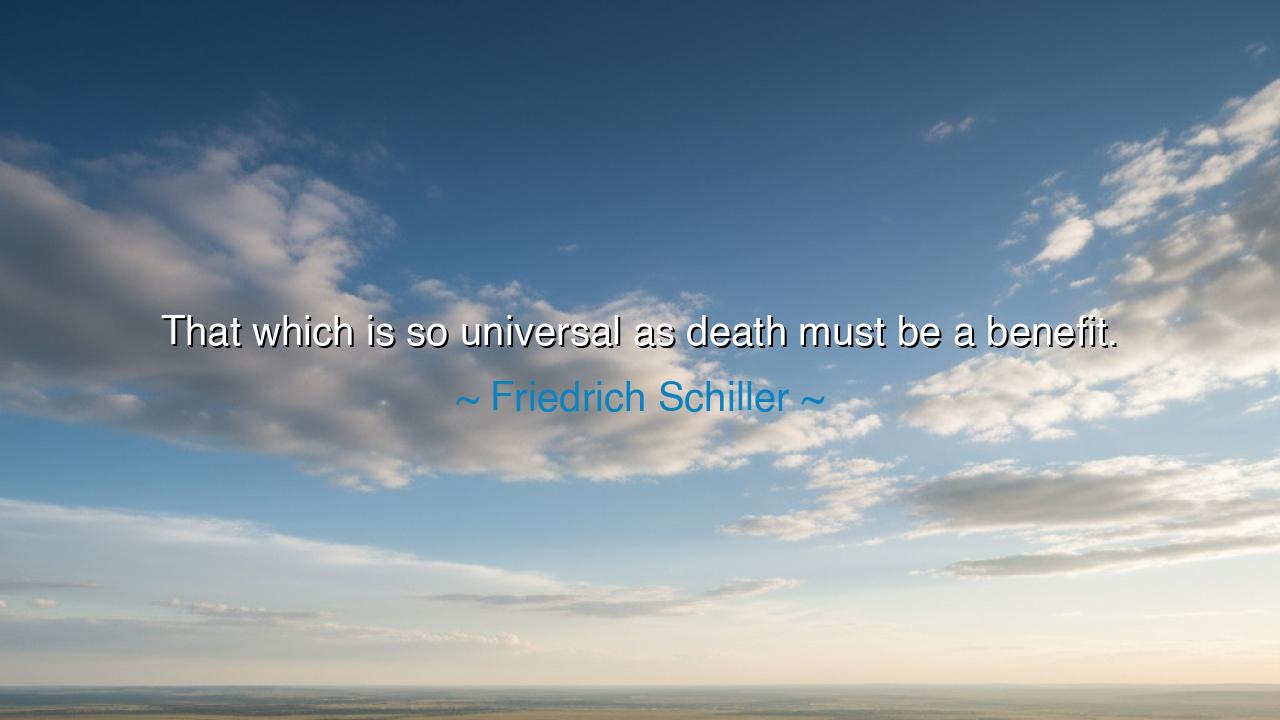
That which is so universal as death must be a benefit.






The sages teach us to look steadily at death, not as a scandal to be hidden but as a teacher that stands in every doorway. When Friedrich Schiller declares, “That which is so universal as death must be a benefit,” he speaks with the calm of one who has watched the tide for a long time. If all peoples, all ages, and all creatures submit to the same last summons, then the summons belongs to the order of things, not to their ruin. In the tongue of the ancients: what is woven into every thread of the tapestry is part of the design, not a tear in the cloth.
Schiller’s claim does not glorify dying; it corrects our sight. He bids us see that the universality of death gives it a moral weight—it levels kings and shepherds, sobers our vanity, and dignifies our days with urgency. That which comes for everyone cannot be merely an accident; it is a boundary that gives the field its shape, a shore that makes the sea navigable, a winter that teaches harvest. Thus the benefit is not in the sting but in the measure it gives to life: beginnings matter because endings are real.
As to the saying’s origin, the line is widely attributed to Schiller and is quoted approvingly by Ralph Waldo Emerson in his essay “Immortality,” collected in Letters and Social Aims (1876): “Schiller said, ‘What is so universal as death, must be benefit.’” Emerson invokes it to argue that the most common facts of existence are not enemies but elder tutors. The exact German wording is elusive in Schiller’s extant works, but the sentiment accords with his lifelong meditation on necessity, freedom, and the formation of character. In effect, the modern sage (Emerson) preserves the ancient cadence of the older sage (Schiller).
Hear now a story to make this wisdom plain. In a small hill town, a midwife became, in age, a hospice nurse. “I have welcomed and I have watched farewell,” she would say, “and the same hush attends both doors.” She kept a little book of last kindnesses: a quarrel settled with two sentences; a recipe dictated with a smile; a grandson taught to tie a fisherman’s knot. None of these erased sorrow. But as the nurse would whisper to families, the universality of death did not diminish their love; it sealed it. The end did not make life meaningless; it made meaning urgent and legible.
History offers a sterner example. When Socrates drank the hemlock, some called it noble, others needless. Yet the cup did not confer value; it revealed it. Socrates had practiced dying daily by choosing truth over fear, duty over flight. That practice—not the manner of his end—was the benefit disclosed by the common law of mortality: we are free to shape our character even when we do not command our fate. The universality of death does not flatten our stories; it tests them, as fire tests bronze.
From this teaching flow clear obligations. First, let the end discipline the middle: if death is universal, then pettiness is extravagant. Keep short accounts—apologize quickly, forgive without interest. Second, order your house as an act of love: write what must be found, bless whom you must not burden, return what is borrowed. Third, practice presence: set aside each day one untaxed hour for the work that outlasts applause—listening, learning, prayer or meditation. These are not rehearsals for dying; they are rehearsals for truth.
Finally, carry the sentence as a lamp for your path: universal, death, benefit. When fear rises, remember the lamp; when vanity swells, remember the shore; when sorrow presses, remember that love’s weight is felt most when time is short. We do not praise the scythe; we praise the harvest that grows because there is a season. So let us live seasonably—bravely, tenderly, and awake—until the last common hour arrives, and we discover that what was common to all has quietly taught each of us how to become uncommon in goodness.






AAdministratorAdministrator
Welcome, honored guests. Please leave a comment, we will respond soon